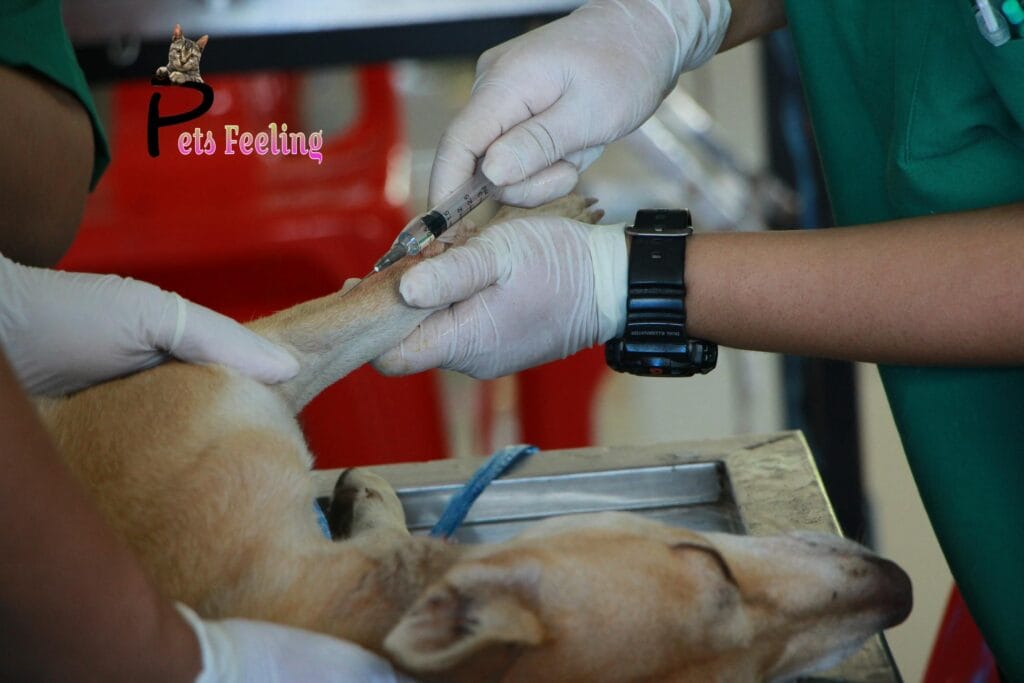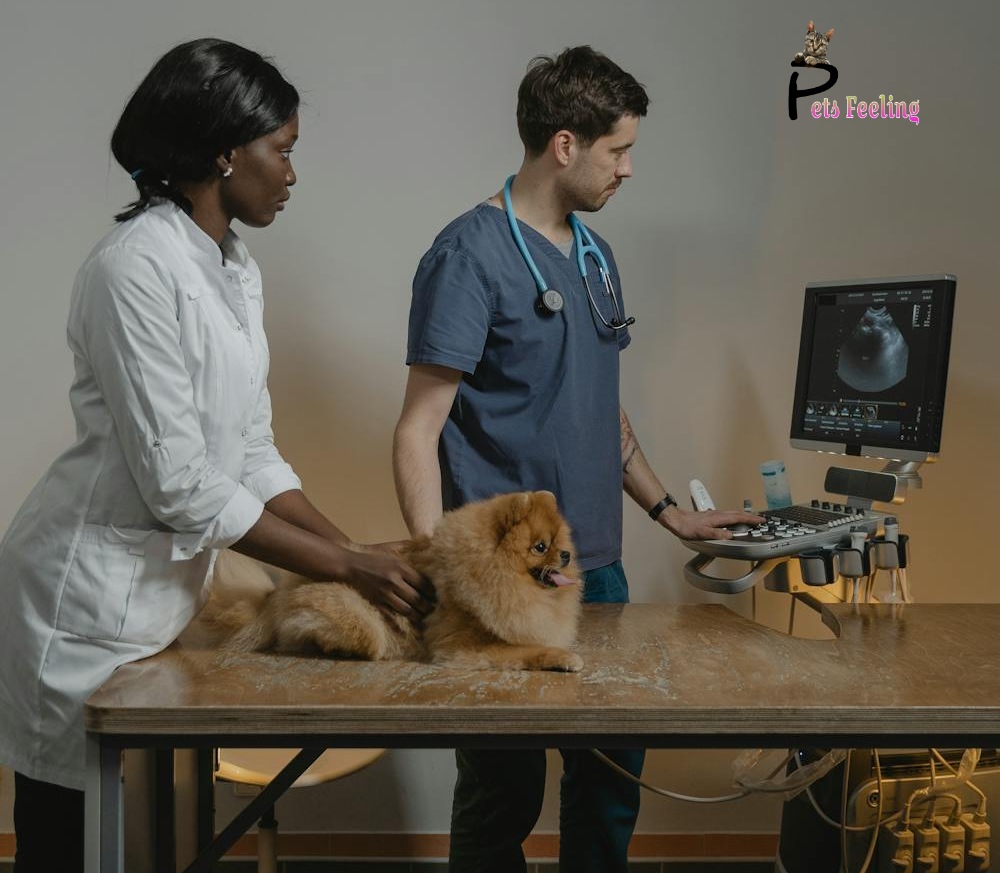The 5 Most Important Steps to Regular Pet Health Checkups: How to Detect Diseases Early
Do you know that regular vet visits can help find diseases early? This keeps your pet happy and healthy. We’ll look at the 5 key steps for your pet’s best health through early care. By following these tips, you can help your pet stay well and catch problems early.
Key Takeaways
- Establishing a relationship with a trusted veterinarian is the foundation of effective pet healthcare.
- Scheduling regular wellness visits is essential for early disease detection and preventive care.
- Comprehensive physical examinations and diagnostic tests are vital for identifying potential health concerns.
- Open communication with your vet is crucial for discussing your pet’s unique needs and concerns.
- Implementing preventive measures, such as vaccinations and parasite control, can significantly improve your pet’s long-term wellbeing.

Introduction to Regular Pet Health Checkups
Keeping our pets healthy is very important for all pet owners. Regular health checkups with a vet are key. These visits help find health problems early and improve our pets’ lives.
Significance of Early Disease Detection
Finding diseases early is crucial for our pets’ care. Regular checkups help spot health issues before they get worse. This way, we can treat them quickly and effectively, helping our pets live longer and healthier lives.
Benefits of Routine Pet Health Exams
Regular health exams do more than just find diseases early. They also offer many benefits for our pets. These exams help with preventive care, like shots and parasite control, keeping our pets safe from diseases. They also let vets check our pets’ growth and health, helping us keep them in top shape.
These visits also help build a strong bond between pet owners and vets. This bond makes it easier to make informed decisions about our pets’ pet health insurance, pet health club memberships, and other pet health care needs. It ensures our pets get the best care possible.
Establishing a Relationship with a Veterinarian
Building a strong bond with a trusted veterinarian is key for your pet’s health. Finding the right vet and talking openly ensures your pet gets the best care. This is important for their whole life.
Finding a good vet starts with looking for one who fits your needs and your pet’s. Look for a vet with a good pet health plan and quality pet health services. Think about the vet’s reputation, experience, and how they handle health issues.
After finding a good vet, build a relationship based on trust and open talk. Ask questions and share your pet’s health concerns. This helps you understand your pet’s health plan and makes you more involved in their care.
Regular vet visits are key for catching health problems early. By keeping up with your pet’s health, you can spot issues before they get worse. This is the heart of the the pet health club, where you and your vet work together to keep your pet healthy.
| Benefits of a Strong Vet-Client Relationship | Characteristics of a Reputable Veterinary Practice |
|---|---|
| Personalized care and attention Early detection of health issues Open communication and trust Customized treatment plans Ongoing support and guidance | Experienced and compassionate veterinarians Comprehensive pet health services Modern facilities and equipment Commitment to preventive care Excellent client communication and education |
By focusing on a strong vet-client relationship, you’re taking a big step for your pet’s health. This partnership is the base for proactive pet health management and the best care for your pet.

Scheduling Regular Wellness Visits
Keeping your pet healthy is very important. One great way to do this is by taking them for regular vet visits. These visits help find health problems early, so they can be treated quickly.
Recommended Frequency of Checkups
The number of vet visits your pet needs depends on their age and health. Here’s a general guide:
- Puppies and kittens: Every 3-4 weeks until they’re 16 weeks old
- Adult pets: See the vet once or twice a year
- Senior pets (7 years and older): Visit the vet twice a year
Preparing for the Appointment
To make your pet’s vet visit effective, prepare well. Here are some tips:
- Write down any health concerns or questions about your pet’s pet health
- Bring any important medical records, like test results or pet health insurance plans
- Take a stool sample if your vet asks for one
- Notice how your pet acts and eats before the visit
- Get there a bit early to help your pet get used to the healthful pets place
By following these steps, you help your vet give your pet the best care. This ensures your pet stays healthy and happy for a long time.
Physical Examination and Diagnostic Tests
During a routine pet health checkup, your vet will do a full physical check. This is key to spotting health problems early. It helps your vet act fast and manage the issue well.
Comprehensive Physical Evaluation
The physical check includes several important steps:
- Vital sign check, like temperature, heart rate, and breathing rate
- Looking at the eyes, ears, nose, and mouth for any oddities
- Feeling the lymph nodes, belly, and other areas for any issues
- Checking the skin, coat, and nails for infections or parasites
- Checking how well the joints and muscles work
Your vet might suggest some tests based on your pet’s age, breed, and health. These tests could be:
- Blood tests to check organ health and find hidden problems
- Urinalysis to spot urinary tract infections or kidney issues
- Fecal tests to find intestinal parasites
- Imaging like X-rays or ultrasounds to see inside your pet
By working with your vet and being involved in your pet’s pet health care, you help catch and manage health issues. This supports your pet’s long life and happiness.
| Diagnostic Test | Purpose |
|---|---|
| Blood work | Check organ function, find hidden issues, and monitor health |
| Urinalysis | Look for urinary tract infections or kidney disease |
| Fecal examination | Find intestinal parasites |
| Imaging tests (X-rays, ultrasounds) | See inside your pet’s body |

Discussing Pet Health Concerns
Talking openly with your vet is key to keeping your pet healthy. A good relationship with your vet helps tackle health issues. This way, you can give your pet the best care they need.
Open Communication with Your Vet
Talking about your pet’s health with your vet is very important. It helps you understand symptoms and treatment plans. You can also look into health and pet insurance together.
- Share any changes in your pet’s behavior, appetite, or activity level.
- Ask questions about their recommended diagnostics, therapies, and preventive measures.
- Collaborate with your vet to create a personalized pet health club regimen tailored to your pet’s unique needs.
Working closely with your vet ensures your pet gets top-notch care. This helps keep them healthy for a long time.
Preventive Care and Treatments
Keeping your pet healthy is very important. Preventive care is key to this. We will talk about vaccinations, parasite control, and nutrition and weight management. These are crucial to keep your pet safe from serious health problems.
Vaccinations and Parasite Control
Vaccinations protect your pet from dangerous diseases. Keeping up with vaccinations is vital for their health. Also, controlling parasites like fleas and ticks is important to prevent health issues.
Nutrition and Weight Management
Good nutrition and weight management are also vital. A balanced diet and watching your pet’s weight can prevent obesity. Obesity can lead to health problems like diabetes and joint issues. A vet can help create a diet and exercise plan for your pet.
| Preventive Care Measure | Benefits |
|---|---|
| Vaccinations | Protect against dangerous diseases, safeguard your pet’s health |
| Parasite Control | Prevent infestations and the health risks associated with parasites |
| Proper Nutrition | Maintain optimal health, support growth and development, and reduce the risk of chronic conditions |
| Weight Management | Prevent obesity-related issues, such as joint problems and diabetes |
By adding these preventive care steps to your pet’s routine, you can keep them healthy. A healthy pet is a happy pet. Proactive care is the secret to their long-term happiness and well-being.
Pet Health: Monitoring and Early Intervention
We know how vital it is to keep our pets healthy. Regular vet visits are key, but watching them closely and acting fast can prevent health problems. With the right pet health care insurance or pet health plan, our pets can stay happy and healthy.
Watching our pets closely is the first step to spotting health issues early. Do they seem hungry or tired? Have they changed in mood or energy? Catching small changes early can help avoid big problems. If we see anything odd, we should talk to our vet right away.
- Keep an eye on your pet’s eating, drinking, and bathroom habits.
- Notice if their energy, mood, or activity level changes.
- Look for any physical changes, like lumps or dental issues.
- Keep a record of any changes or concerns to share with your vet.
It’s important to work closely with our vet for early intervention. Catching problems early can prevent them from getting worse. Regular vet visits, open talks, and quick action can protect our pets’ health for years to come.
“Early detection and intervention can make all the difference in maintaining your pet’s health and well-being.”
Building a strong bond with our vet and watching our pets closely helps us prevent health issues. This dedication to their care gives us peace of mind and helps them live longer, healthier lives.
Conclusion
Regular pet health checkups are key to keeping our pets happy and healthy. By following the steps in this article, we can spot diseases early. This helps us give our pets the care they need and keep them happy.
Getting regular checkups for our pets is good for them and for us. It helps catch health problems early, which means better treatment and a better life for our pets. Plus, a good vet can help keep our pets healthy and happy.
Showing we care about our pets’ health shows how much we love them. By making regular vet visits a priority, we keep our pets healthy and happy for a long time. This way, we ensure our pets get the best care and enjoy many more years with us.
FAQ
What is the significance of early disease detection in pet health checkups?
Early disease detection is key for our pets’ health. Regular vet visits help spot health issues early. This way, we can treat them quickly and effectively.
What are the benefits of regular pet health exams?
Regular health exams for pets have many benefits. They help find and fix health problems early. They also keep an eye on your pet’s health and ensure they get the care they need.
How do we establish a strong relationship with a veterinarian?
A strong vet relationship is vital for your pet’s health. Look for a good vet practice and talk openly with them. Work together to give your pet the best care.
How often should we schedule wellness visits for our pets?
Wellness visit frequency depends on your pet’s age and health. Healthy adult pets should visit at least once a year. Puppies, kittens, and seniors need more frequent check-ups.
What should we expect during a comprehensive physical examination?
A pet health check includes a full physical exam. Your vet will check vital signs and body systems. They might also suggest tests to find health issues.
How can we effectively communicate our pet’s health concerns with the veterinarian?
Talking openly with your vet is important for your pet’s health. Share any health concerns or changes you’ve noticed. Work with your vet to create the best care plan.
What preventive care measures should we implement to maintain our pet’s health?
Preventive care keeps pets healthy. Make sure they’re up-to-date on shots and control parasites. Feed a balanced diet and watch their weight and condition.
How can we monitor our pet’s health and intervene early if necessary?
Keeping an eye on your pet’s health is crucial. Watch for behavior and physical changes. Work with your vet to address any issues quickly.
MORE ARTICLE : https://petsfeeling.com/blog-2/
IMPORTANT ADDITIONS
Edited on , SEPTEMBER 21,2024
social media :
facebook : https://www.facebook.com/PetsFeeling0/
tiktok : https://www.tiktok.com/@pets.feeling
instagram : https://www.instagram.com/pets._.feeling/
youtube : https://www.youtube.com/@Pets-Feeling

